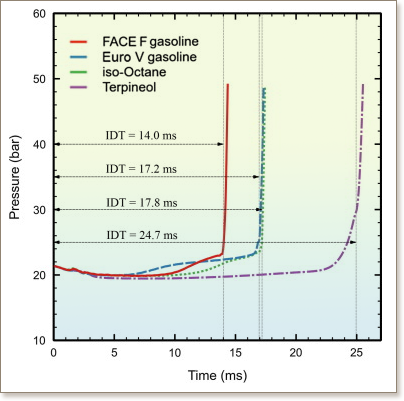Terpineol as a novel octane booster for extending the knock limit of gasoline


Improving the octane number of gasoline offers the potential of improved engine combustion, as it permits spark timing advancement without engine knock. This study proposes the use of terpineol as an octane booster for gasoline in a spark ignited (SI) engine. Terpineol is a bio-derived oxygenated fuel obtained from pine tree resin, and has the advantage of higher calorific value than ethanol. The ignition delay time (IDT) of terpineol was first investigated in an ignition quality tester (IQT). The IQT results demonstrated a long ignition delay of 24.7 ms for terpineol and an estimated research octane number (RON) of 104, which was higher than commercial European (Euro V) gasoline. The octane boosting potential of terpineol was further investigated by blending it with a non-oxygenated gasoline (FACE F), which has a RON (94) lower than Euro V gasoline (RON = 97). The operation of a gasoline direct injection (GDI) SI engine fueled with terpineol-blended FACE F gasoline enabled spark timing advancement and improved engine combustion. The knock intensity of FACE F + 30% terpineol was lower than FACE F gasoline at both maximum brake torque (MBT) and knock limited spark advance (KLSA) operating points. Increasing proportions of terpineol in the blend caused peak heat release rate, in-cylinder pressure, CA50, and combustion duration to be closer to those of Euro V gasoline. Furthermore, FACE F + 30% terpineol displayed improved combustion characteristics when compared to Euro V gasoline.

"KAUST shall be a beacon for peace, hope and reconciliation, and shall serve the people of the Kingdom and the world."
King Abdullah bin Abdulaziz Al Saud, 1924 – 2015
Thuwal 23955-6900, Kingdom of Saudi Arabia
© King Abdullah University of Science and Technology. All rights reserved